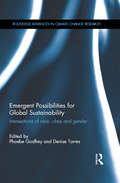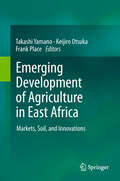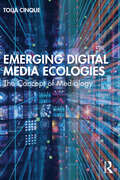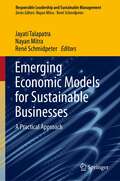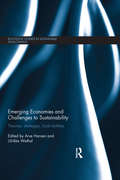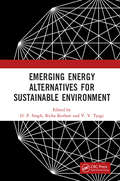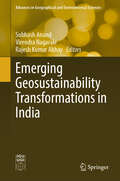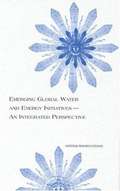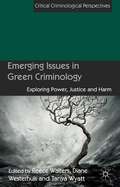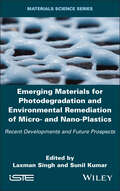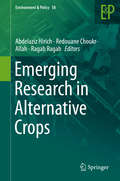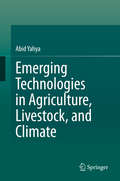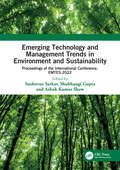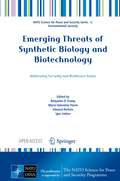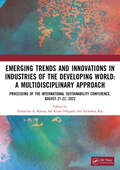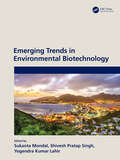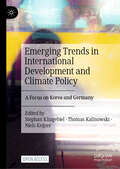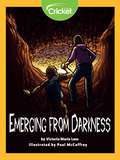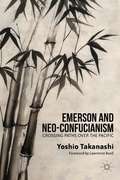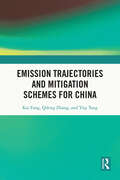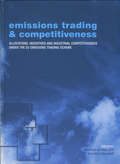- Table View
- List View
Emergency Deep
by Michael DimercurioIslamic terrorists acquire the deadliest submarine in the world
Emergency Home Preparedness: The Ultimate Guide for Bugging In During Natural Disasters, Pandemics, Civil Unrest, and More
by EJ SnyderAre you prepared for the uncertainties that may lie ahead? In a world filled with pandemics, natural disasters, civil unrest, and the constant specter of war, the need for readiness has never been more crucial. Enter EJ Snyder--an extreme survivalist and 25-year Army combat veteran, who has not only faced the challenges of the wilderness on television's "Naked and Afraid," "Dual Survival," and "First Man Out," but has also developed a profound expertise in preparing for emergencies on home turf. In Emergency Home Preparedness, Snyder shares critical insights and life-saving tips gleaned from his extensive military service and survivalist experiences. This comprehensive guide provides a blueprint for individuals from all walks of life. What's Inside: Learn how to prepare a get-home bag and set up your vehicle for emergencies. Understand the framework for "Bugging In" and discover the essentials of P.A.C.E. Planning. Explore considerations for Everyday Carry (EDC), emergency communications, and vehicle preparedness. Gain insights into setting up caches, building community and networking for collective preparedness. Through engaging storytelling, practical advice, and step-by-step instructions, Snyder empowers readers with the tools necessary to thrive amidst uncertainty so they can unlock their potential, embrace the adventurer within, and embark on an awe-inspiring journey of knowledge and self-discovery. Emergency Home Preparedness is the essential guide to uncovering the secrets of survival, resilience, and the indomitable human spirit in the face of any challenge.
Emergent Possibilities for Global Sustainability: Intersections of race, class and gender (Routledge Advances in Climate Change Research)
by Phoebe Godfrey Denise TorresIt must be acknowledged that any solutions to anthropogenic Global Climate Change (GCC) are interdependent and ultimately inseparable from both its causes and consequences. As a result, limited analyses must be abandoned in favour of intersectional theories and practices. Emergent Possibilities for Global Sustainability is an interdisciplinary collection which addresses global climate change and sustainability by engaging with the issues of race, gender, and class through an intersectional lens. The book challenges readers to foster new theoretical and practical linkages and to think beyond the traditional, and oftentimes reductionist, environmental science frame by examining issues within their turbulent political, cultural and personal landscapes. Through a variety of media and writing styles, this collection is unique in its presentation of a complex and integrated analysis of global climate change and its implications. Its companion book, Systemic Crises of Global Climate Change, addresses the social and ecological urgency surrounding climate change and the need to use intersectionality in both theory and practice. This book is a valuable resource for academics, researchers and both undergraduate and post-graduate students in the areas of Environmental Studies, Climate Change, Gender Studies and International studies as well as those seeking a more intersectional analysis of GCC.
Emerging Development of Agriculture in East Africa
by Frank Place Keijiro Otsuka Takashi YamanoEmerging Development of Agriculture in East Africa offers case studies that find promise in many new innovations. Farmers in Uganda have quickly learned the management of NERICA rice (a new upland rice variety), which is being disseminated in a limited way in the region. Also in Uganda, farmers living in more remote areas have improved access to markets due to the expansion of mobile phones. In Kenya, improved milk marketing systems have increased efficiency and led to tangible increases in the adoption of dairy production technologies. And the adoption of intensive dairy production systems in Kenya and Uganda are providing significant amounts of manure and positively impacting yields of maize and banana.
Emerging Digital Media Ecologies: The Concept of Medialogy
by Toija CinqueEmerging Digital Media Ecologies: The Concept of Medialogy investigates the profound ways in which digital media reshapes our cultural, socio-technological, political, and natural landscapes. Through interdisciplinary empirical and creative case studies, the book defines and illuminates the nuances of medialogy, emphasising the often-underestimated impact of emerging technologies across interactive education, data gathering, visual-data representations, and creative practice. It explores the intersection of the natural and technological worlds, contextualising our use of natural resources against climate change and sustainable economies.Divided into two parts, the book delves into the theoretical underpinnings of digital media ecologies and their practical applications. Part 1 traces the evolution of media technologies, examining their environmental impact and the foundational approaches to understanding media’s complex interconnections. Part 2 focuses on contemporary issues such as hyperpersonalised media, digital literacy, and the transformative power of Indigenous media narratives.Additionally, the monograph explores the revolutionary role of Artificial Intelligence (AI) and large language models like ChatGPT-4o and those that follow in shaping our digital future. It investigates how AI transforms creative practices, data processing, and communication, contributing to the formation of new media ecologies. The ethical implications, commodification, identity formation, and the impact of AI-driven technologies on everyday life are critically examined, offering insights into the future of human–technology interactions.This book is a crucial reference for scholars, practitioners, and students in digital humanities, media studies, environmental humanities, and anyone interested in the cultural implications of emerging digital technologies and their impact on our environment and society.
Emerging Economic Models for Sustainable Businesses: A Practical Approach (Responsible Leadership and Sustainable Management)
by René Schmidpeter Nayan Mitra Jayati TalapatraThe book discusses new and emerging economic models, that respond to 'Pulling' and 'Pushing' forces. Today we are poised at an interesting juncture, with favourable conditions making it easier to be a sustainable organization acting as a ‘Pulling’ Force and the climate crisis, rise in social-economic equities thereby ‘Pushing’ for urgent action. The book analyses economic models that look at value propositions, creation and capture with ‘People, Planet and Profit’ deeply embedded in each stage of the value chain. The contributions bring out the interplay between new standards, evaluation frameworks, technology innovation and other emerging tools to show how they create a sustainable business. For this, they lean on learnings from successful sustainable businesses. Business leaders will find that this book provides deep insights on improving their existing sustainable practices, and speeding up the transition from linear to circular, narrow stakeholder driven to community driven. For prospective entrepreneurs the book provides the nudge needed to start up a sustainable enterprise. Students and researchers can benefit from real-life examples of how sustainable transformations unfold.The book thus creates an easy guide for those willing to make the transition to sustainability, start a sustainable business and most of all, to motivate those who may not yet be convinced about the long-term sense of taking care of our people and our earth.
Emerging Economies and Challenges to Sustainability: Theories, strategies, local realities (Routledge Studies in Sustainable Development)
by Arve Hansen Ulrikke WethalThe rise of emerging economies represents a challenge to traditional global power balances and raises the question of how we can combine sustainability with continued economic growth. Understanding this global shift and its impact on the environment is the paramount contemporary challenge for development-oriented researchers and policy makers alike. This book breaks new ground by combining scholarship on the role of emerging economies with research on sustainable development. The book investigates how the development strategies of emerging economies challenge traditional development theory and sustainability discourses. With regional introductions and original case studies from South Asia, East Asia, Latin America and Sub-Saharan Africa, it discusses how to conceptualise sustainable development in the global race for economic prosperity. What characterises the development strategies of emerging economies, and what challenges are these posing for global sustainable development? How can emerging economies shed light on the global challenges, dilemmas and paradoxes of the relationship between socio-economic improvements and environmental degradation? This book will be a valuable resource for researchers and postgraduates in development studies, geography, economics and environmental studies.
Emerging Energy Alternatives for Sustainable Environment
by Richa Kothari D. P. Singh V. V. TyagiSustainability of environment is an emerging global issue at present. Unsustainable or deteriorating environment is a matter of concern as it has threatened the survival of living creatures. Recently, climate change has been a matter of great concern at a global platform owing to imbalances in natural environment. Increasing population has increased the demand for energy, which has ultimately put pressure on natural resources and caused a paradigm shift from resource generation to exploitation. Emerging Energy Alternatives for Sustainable Environment aims to address the role of sustainable technologies in energy generation options for clean environment. It covers a wide spectrum of energy generation approaches, with an emphasis on five key topics: (i) renewable energy sources and recent advances, (ii) emerging green technologies for sustainable development, (iii) assessment of biomass for sustainable bioenergy production, (iv) solid waste management and its potential for energy generation, and (v) solar energy applications, storage system, and heat transfer. This book provides essential and comprehensive knowledge of green energy technologies with different aspects for engineers, technocrats and researchers working in the industry, universities, and research institutions. The book is also very useful for undergraduate and graduate students of science and engineering who are keen to know about the development of renewable energy products and their corresponding processes. Please note: This volume is Co-published with The Energy and Resources Institute Press, New Delhi. Taylor & Francis does not sell or distribute the Hardback in India, Pakistan, Nepal, Bhutan, Bangladesh and Sri Lanka
Emerging Geosustainability Transformations in India (Advances in Geographical and Environmental Sciences)
by Subhash Anand Virendra Nagarale Rajesh Kumar AbhayThis book presents the emerging sustainability concerns for India to achieve holistic development. India is densely populated with scattered natural resources and is engaged in developing technology and its infrastructure. However, India’s sustainability is questioned from the viewpoints of environment, society, economy and politics. As the Sustainable Development Goals (SDGs) aims to achieve a sustainable world by 2030, India has to relook at its current development approaches and make effective policy measures. Geography is an interdisciplinary branch of social science that focuses on the interrelationships among population, natural resources, social linkages, governments and public policy. Within this interdisciplinary concept, the book presents a collection of studies from scholars in India. We ask questions such as, (1) what major geographical approaches and perspectives exist related to sustainability, (2) how socioeconomic and political factors affects sustainability and SDGs, (3) what approach is the most effective from the sustainability perspective, and (4) how we address sustainability issues. The book serves as a valuable reference for those who are concerned with the progress of sustainability in India.
Emerging Global Water and Energy Initiatives-- An Integrated Perspective
by Global Energy Water Cycle Experiment Gewex PanelThe National Academies Press (NAP)--publisher for the National Academies--publishes more than 200 books a year offering the most authoritative views, definitive information, and groundbreaking recommendations on a wide range of topics in science, engineering, and health. Our books are unique in that they are authored by the nation's leading experts in every scientific field.
Emerging Issues in Green Criminology
by Tanya Wyatt Reece Walters Diane Solomon WesterhuisThis edited collection brings together internationally renowned scholars to explore green criminology through the interdisciplinary lenses of power, harm and justice. The chapters provide innovative case study analyses from around the world that seek to advance theoretical, policy and practice discourses about environmental harm.
Emerging Materials for Photodegradation and Environmental Remediation of Micro- and Nano-Plastics: Recent Developments and Future Prospects (ISTE Invoiced)
by Sunil Kumar Laxman SinghEmerging Materials for Photodegradation and Environmental Remediation of Micro- and Nano-Plastics provides an in-depth understanding of the materials, design choices and applications needed for the mitigation of micro- and nano-plastic pollutants from environmental wastewater. This is a topic that continually attracts attention worldwide. This is an important book for academic institutes and libraries, scientific organizations, and global research industries, and has been created for a wide audience. The book provides the scope of material design, synthesis, detailed mechanisms, spectroscopic analysis, and problem-solving strategies in environmental remediation. The scope of the book on reactive, functional materials and applications extends far beyond the emerging technologies that possess valuable insights of the synthesis, processing and physiochemical characteristics and their functional properties for academics, postgraduates, research scholars, scientists, technologists, environmental chemists and industrialists. This book presents fifteen chapters, which explore new ideas in processing, designing, synthesis, selection, application, photocatalytic efficiency and economic justifications of emerging materials.
Emerging Research in Alternative Crops (Environment & Policy #58)
by Ragab Ragab Redouane Choukr-Allah Abdelaziz HirichThis book provides case studies on cultivating alternative crops and presents new cropping systems in many regions of the world. It focusses on new emerging research topics aiming to study all aspects of adaptation under several stresses including agricultural, environmental, biological and socioeconomic issues. The book also provides operational and practical solutions for scientists, producers, technology developers and managers to succeed the cultivation of new alternative crops and, consequently, to achieve food security.Many regions in the world are suffering from water scarcity, soil and water salinization and climate change. These conditions make it difficult to achieve food security by cultivating conventional crops. A renaissance of interest for producing alternative crops under water scarcity and water salinization has been, therefore, implemented primarily among small-scale producers, researchers and academics.The use of alternative crops (quinoa, amaranth, legume crops, halophytes, …etc.) may provide some environmental benefits such as valorization of salt-affected soils, reduced pesticide application, enhanced soil and water quality and promotion of wildlife diversity. This also may provide some economic benefits such as providing the opportunity for producers to take advantage of new markets and premium prices, spreading the economic risk and strengthening local economies and communities. Furthermore, alternative crops are often rich in proteins and minerals, and even some of them are Gluten free (quinoa). This reflects their importance to achieve food security in quantity and quality scale. The year 2013 was exceptional for alternative crops as it was the international year of quinoa celebrated by Food and Agriculture Organization (FAO). This reflects the importance of research conducted on quinoa and other alternative crops in many regions of the world.
Emerging Technologies in Agriculture, Livestock, and Climate
by Abid YahyaThis book provides applications of wireless sensor networks (WSN) in environmental monitoring, with an emphasis on livestock disease detection and agricultural management in Africa to aid farmers. This proposed system entails current and innovative monitoring technologies intended to improve agricultural conditions in Africa, with a focus on Botswana, and addresses the Internet of Things (IoT) as a set of remote monitoring protocols using WSNs to improve and ensure proper environmental maintenance. In this book, the author introduces WSNs, and how the IoT can be applied to develop a system of "smart agriculture" in Africa, taking into account livestock health, climate change impacts on crops and wildlife, and technological innovations in response to climate change such as windmills and solar panels. The book will be interesting to students and researchers in engineering and life sciences, as well as practitioners working with sensing technologies for agricultural monitoring and improvement.
Emerging Technology and Management Trends in Environment and Sustainability: Proceedings of the International Conference, EMTES-2022
by Sushovan Sarkar Shubhangi Gupta Ashok Kumar ShawThe International Conference (EMTES 2022) is oriented to include the themes like Water Quality Management, Advanced Water Treatment, Advanced Wastewater Treatment, Assessment and Control of Air Pollution, Solid and Hazardous Waste Management, Prevention of Groundwater Contamination, Wetland Management/Phyto-remediation, Case studies in Industrial Pollution Control, Liquid waste management, recent advancement in engineering, technology and management for optimization of environmental issues, application of IOT and IT in remedial measure of Environment and sustainability, Health issues and safety.
Emerging Threats of Synthetic Biology and Biotechnology: Addressing Security and Resilience Issues (NATO Science for Peace and Security Series C: Environmental Security)
by Igor Linkov Benjamin D. Trump Marie-Valentine Florin Edward PerkinsSynthetic biology is a field of biotechnology that is rapidly growing in various applications, such as in medicine, environmental sustainability, and energy production. However these technologies also have unforeseen risks and applications to humans and the environment. This open access book presents discussions on risks and mitigation strategies for these technologies including biosecurity, or the potential of synthetic biology technologies and processes to be deliberately misused for nefarious purposes. The book presents strategies to prevent, mitigate, and recover from ‘dual-use concern’ biosecurity challenges that may be raised by individuals, rogue states, or non-state actors. Several key topics are explored including opportunities to develop more coherent and scalable approaches to govern biosecurity from a laboratory perspective up to the international scale and strategies to prevent potential health and environmental hazards posed by deliberate misuse of synthetic biology without stifling innovation. The book brings together the expertise of top scholars in synthetic biology and biotechnology risk assessment, management, and communication to discuss potential biosecurity governing strategies and offer perspectives for collaboration in oversight and future regulatory guidance.
Emerging Trends and Innovations in Industries of the Developing World: A Multidisciplinary Approach
by Sai Kiran Oruganti Sudeshna Ray Dimitrios A. KarrasISC 2022 is dedicated to the Niti Aayog policies to promote sustainability through exchange of ideas emerging out of the academia. The ISC is an annual conference that is held in virtual mode until COVID restrictions on travel exist. The vision of the conference is to capacitate Academia with the necessary ideas that provide insights of the grassroot level development to various stakeholders of the Niti-Aayog policies. Towards this goal, the conference creates a conjunction of various stakeholders of Niti-Aayog policies that include- academic institutions, government bodies, policy makers and industry. The ISC organizers make concerted efforts to promote academic research that would technological, scientific, management & business practices, and insights into policy merits & disruptions. The framework of exchange of ideas is geared towards adoption of deep technologies, fundamental sciences & engineering, energy research, energy policies, advances in medicine & related case studies. This framework enables the round table discussions between the academia, industry and policy makers through its range of plenary and keynote speakers.
Emerging Trends in Environmental Biotechnology
by Sukanta Mondal Shivesh Pratap Singh Yogendra Kumar LahirThe environment is an all-encompassing component of the ecosystem of "Blue planet - the earth", made up of the hydrosphere, atmosphere and lithosphere. These three spheres have biotic and abiotic components which exhibit ecological homeostasis that provides the most appropriate survival chances for the members of biotic component and geochemical balance with abiotic components. This ecosystem is subjected to relatively harsh conditions, mostly created by the disastrous activities due to natural calamities and intentional and/or accidental anthropogenic activities. Biotechnology has become a potential tool to dissipate such environmental impacts because of the advancement it has undergone recently. Emerging Trends in Environmental Biotechnology is an outstanding collection of current research that integrates basic and advanced concepts of biotechnology such as genomics, proteomics, bioinformatics, sequencing, and imaging processes to improvise and protect the environment. This book is particularly attractive for scientists, researchers, students, educators and professionals in environmental science, agriculture, veterinary and biotechnology science. The book will enable them to solve the problems about sustainable development with the help of current innovative biotechnologies such as recombinant DNA technology and genetic engineering which have tremendous potential for impacting global food security, environmental health, human and animal health and overall livelihood of mankind. Features Presents easy-to-read chapters Information is presented in a very accessible and logical format Identifies and explores biotechnological approaches for environmental protection Encompasses biodegradation of hazardous contaminants, biotechnology in waste management, nanotechnology, and issues in environmental biotechnology research
Emerging Trends in International Development and Climate Policy: A Focus on Korea and Germany
by Stephan Klingebiel Thomas Kalinowski Niels KeijzerThis open access book delves into the considerable alignment of global sustainable development priorities between Germany and the Republic of Korea (hereafter referred to as Korea), despite their geographical separation. Notably, both nations share a common commitment to development policy and international climate action, an alignment that holds immense potential for enhanced cooperation in today’s evolving global landscape. Germany’s historical role as a founding member of the international development cooperation system juxtaposes with Korea’s more recent entry into the Organisation for Economic Co-operation and Development (OECD) and its Development Assistance Committee (DAC) in 2010. Korea has transformed from a significant development assistance recipient to an active provider, a transition mirrored in its engagement in international climate finance. Within this dynamic context, the book thoroughly examines key aspects such as the evolving development policy profiles of Germany and Korea, their roles in international organizations, and their shared commitment to international climate policies. It also explores avenues for deeper collaboration between these like-minded partners, all against the backdrop of an evolving geopolitical focus, including the new Indo-Pacific emphasis.
Emerging from Darkness
by Victoria Marie LeesSiblings Michelle and William are out on a caving adventure when they end up losing their way.
Emerson and Neo-Confucianism
by Yoshio TakanashiA comparative investigation of Emerson's Transcendental thought and Zhu Xi's Neo-Confucianism, this book shows how both thinkers traced the human morality to the same source in the ultimately moral nature of the universe and developed theories of the interrelation of universal law and the human mind.
Emerson, the Stoics, and Me: Timeless Wisdom for Living an Authentic Life
by Mark Matousek“This is a beautiful book, full of ideas that could help restore America’s genius for freedom and promise.” —Thomas Moore, New York Times bestselling author of Care of the SoulA lifelong Emersonian scholar, teacher, and spiritual seeker reveals how American philosopher Ralph Waldo Emerson’s twelve essential teachings hold the answer to living an authentic and fulfilling life, one that is in harmony with our souls.Ralph Waldo Emerson was a spiritual revolutionary whose profound vision of human potential came to define the American character. Known as America’s original Stoic, he offered a radical message of optimism, authenticity, and self-realization that is more necessary today than ever.In this timely, remarkable book, noted memoirist and teacher Mark Matousek reveals the depths of Emerson’s extraordinary wisdom, demonstrating how his timeless philosophy can help us navigate the challenges of contemporary life. Using personal stories, psychological research, and life lessons from Emerson and his contemporaries—including Thoreau and Whitman—he offers practical lessons in the art of living.They include:ON ORIGINALITY—Character is everythingON PERSPECTIVE—You are how you seeON NONCONFORMITY—Build your own worldON RESILIENCE—Without confidence, the universe is against youON VITALITY—A stream of power runs through youAnd moreEmerson’s far-reaching vision of excellence and spiritual flourishing is the medicine we need to heal ourselves. “Trust yourself,” he teaches. “Once you make a decision, the universe conspires to make it happen.” This philosophy of hope, known as transcendentalism, is the vein of gold in the American psyche. Lessons from an American Stoic helps us to reclaim our national treasure.
Emile and the Field
by Kevin YoungIn this lyrical picture book from an award-winning poet, a young boy cherishes a neighborhood field throughout the changing seasons. With stunning illustrations and a charming text, this beautiful story celebrates a child's relationship with nature. There was a boynamed Emilewho fellin love with a field.It was wideand blue--and if you could haveseen itso would've you.Emile loves the field close to his home--in spring, summer, and fall, when it gives him bees and flowers, blossoms and leaves. But not as much in winter, when he has to share his beautiful, changeable field with other children...and their sleds. This relatable and lyrical ode to one boy's love for his neighborhood field celebrates how spending time in nature allows children to dream, to imagine...and even to share.
Emission Trajectories and Mitigation Schemes for China
by Kai Fang Qifeng Zhang Yiqi TangThis book seeks to model the possible emission trajectories and identify the feasible mitigation schemes for China to meet its climate commitments to peak emissions before 2030 and net zero emissions before 2060. In line with these ambitions, China has taken a number of measures to improve carbon efficiency and energy structure in recent years. The book first analyzes changes in the carbon footprint at the city level, identify the different pathways to peak emissions by province and industry, and develop a bottom-up approach to determining when and how China could reach peak emissions. It then illustrates how the Emissions Trading Scheme (ETS) reduces abatement costs, and examines the cost-saving effects under carbon intensity reduction and peak emissions targets. Based on the findings and the status quo in China, the authors propose a multicriteria allocation scheme for carbon emission allowances at the provincial level and quantify the impact of sectoral coverage on the abatement costs of the ETS by developing a cost-based approach to sectoral coverage in China. In addition, the co-benefits between CO2 and PM2.5 reductions as a result of the ETS operation are elaborated. The book will benefit researchers and policy-makers interested in environmental governance, climate policy, environmental economics, and sustainable development.
Emissions Trading and Competitiveness: Allocations, Incentives and Industrial Competitiveness under the EU Emissions Trading Scheme (Climate Policy Series)
by Michael GrubbComplying with the forthcoming tightening of CO2 emission allocations in the EU may mean big bills for the industries affected. In this special issue of Climate Policy journal, leading experts examine the impacts on competitiveness and the commercial incentives available from the CO2 allowance allocations under the methodologies, and whether - and if so at what stage - the ETS itself may need to be amended. The study is multidisciplinary, combining economic, legal and policy analysis with specific studies of impacts on electricity, cement and other industrial sectors and the allocation issues. It brings together the results of research conducted over the past two year from various research centres and consultancies in Europe, and in particular, work commissioned by the Carbon Trust and Climate Strategies Network. Through these, it presents the most comprehensive and detailed set of analyses yet conducted of the impacts of allocation on competitiveness - one of the most critical issues for the sectors affected and for the operation of the ETS.


